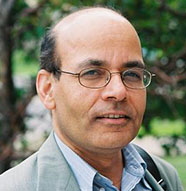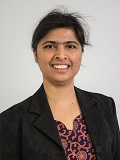Proceedings of the International Conference
on Statistics: Theory and Applications (ICSTA'19)
AUGUST 13 - 14, 2019 | LISBON, PORTUGAL
The keynote information for the International International Conference on Statistics: Theory and Applications (ICSTA'19) is as follows:

Dr. Yogendra P. Chaubey
Concordia University, Canada

Dr. Noelle Samia
Northwestern University, USA

Dr. Dalia Chakrabarty
Loughborough University, UK
ICSTA'19 Keynote Speakers

Dr. Yogendra P. Chaubey
Concordia University, Canada
Yogendra P. Chaubey obtained his M. Stat. degree from the Indian Statistical institute in 1972 and joined the University of Rochester for his doctoral degree. After completing his Ph.D. from the University of Rochester, he took up a Post-Doctoral position at the Carleton University and subsequently joined Dalhousie University, Halifax as an Assistant Professor (1977-79). He moved to Concordia University, Montreal in 1979, where he currently holds the position of Professor in the Department of Mathematics and Statistics. Dr. Chaubey served the department of mathematics as Chair during 2005-20014 and 2016-17.
He has been quite active in promoting Statistics through membership in various capacities of several statistical associations. He has served as an organizer of several academic sessions for several scholarly conferences, notably those held at Concordia University in 1991, 2001 and 2011. He also organized a workshop on Nonparametric Curve Smoothing (NCS 2013) at Concordia University in 2013.
He is an elected member of International Statistical Institute since 2005 and is a member of Provost's Circle at Concordia University. He was honored with "Life Achievement Award" for his contributions to Statistical Theory and Practice at the Silver Jubilee International Conference on Interdisciplinary Mathematics, Statistics and Computational Techniques of Forum for Interdisciplinary Mathematics in association with Manipal University, Jaipur, India, during December 22-24, 2016. He also gave several invited talks at international scholarly conferences, including one at the recent 2017 World Statistics Congress held in Morocco. His current area of research is focused on non-parametric functional estimation that is funded by a discovery grant from Natural Sciences and Research Council of Canada.
Topic of Keynote:
Nonparametric Smooth Estimation of Probability Density Function and Other Related Functionals: Some New Developments

Dr. Noelle Samia
Northwestern University, USA
Noelle I. Samia. B.S. (Valedictorian) in Mathematics, Notre Dame University, Lebanon; M.S. in Actuarial Science, University of Iowa, USA; Ph.D. in Statistics, University of Iowa, USA. Dr. Noelle I. Samia is an associate professor in the Department of Statistics at Northwestern University, USA. Her research work focuses on introducing and developing new statistical linear and nonlinear (threshold) models for count time-series and spatial data. Her work is both, theoretical and applied in nature. Through crossdisciplinary collaborations, these advanced and often new statistical methodologies are tailored to each specific application with the aim of explaining the dynamics of complex biological systems, particularly in the areas of infectious diseases and epidemiology, statistical ecology, and biomedical research. Her fields of research include nonlinear (e.g., threshold) spatio-temporal modeling, count time-series data, statistical inference for infectious diseases, statistical ecology, and statistical applications to biomedical research.
Topic of Keynote:
Threshold models for time series of counts: MRSA as a case study

Dr. Dalia Chakrabarty
Loughborough University , UK
Dalia Chakrabarty's M.S was in Physics, from the Indian Institute of Science. She obtained her D.Phil from the University of Oxford, where her doctoral work included the development of a new Bayesian method applied to the learning of the gravitational mass of the central black hole in the Milky Way, and modelling of non-linear dynamical effects of relevant galactic features. Thereafter, she continued to undertake the development of probabilistic methodologies given astronomical data, and since moving to Warwick Statistics as a Research Fellow in 2009 - following a Royal Society Dorothy Hodgkin Fellowship - she diversified into developing new methods to address problems in other disciplines as well, including Materials Science; Chemistry; Healthcare; Petrophysics; Psychometrics, etc. Her work helps towards laying foundations of our understanding within Applied Probability and Statistics, when faced with assorted peculiarities of real-world data, thus enabling the corresponding real-world applications that would have remained intractable otherwise.
From December 2012 to February 2017, she was a Lecturer in Statistics in the Department of Mathematics at the University of Leicester, UK. There she was the first Director of the MSc in Data Analysis for Business Intelligence. She is currently a Lecturer in Statistics in the Department of Mathematical Sciences at Loughborough University, where she works with 2 Ph.D students, subsequent to her first student having completed last year. She has been, and continues to be, part of multiple national and international collaborations, in both methodology development and applications. She has given multiple invited talks at different conferences, and organised international meetings, including the CRiSM workshop on ``Contemporary Issues in Hypothesis Testing'', Warwick, 2016.
A substantive fraction of her work is dedicated to high-dimensional Gaussian Process-based Bayesian learning of functional relationships between variables, with the ultimate aim of predicting variable values, given data that is: shaped as a hyper-cuboid in general; comprised of elements that are discontinuously and differently correlated with each other; perhaps also temporally-evolving. Her interest in learning correlation structures of random objects have led her to propose a new method of learning uncertainty-included graphical models and networks, supplemented by a new inter-graph distance. She is keen on developing learning methodologies in highly information-sparse environment, (when training data is absent, and information on distributions of variables unavailable). In addition, she works on addressing mis-specified models, and developing tests for Bayesianly testing a simplified model, outside which computation is intractable. In the past, she has worked on Bayesian inverse problems; hierarchical regression; development of a novel classification technique; and in numerical modelling of galaxies.
Topic of Keynote:
Bayesian Learning of the Correlation Structure of High-Dimensional Random Objects.